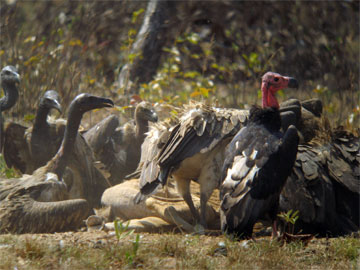
This 'venue' of vultures (a group of vultures can also be called a 'committee' or a 'wake') in this image includes slender billed (l), white-rumped (m), and red-headed vultures (r), all of which have persisted in Cambodia while other vulture populations in Asia have all but vanished. Photo credit: Hugh Wright. Caption: WCS
mongabay.com
September 02, 2010
The number of threatened vultures in Cambodia is on the rise according to a new survey by Wildlife Conservation Society (WCS) and other members of the Cambodia Vulture Conservation Project.
The annual census found 296 birds among the country's three vulture species: the white-rumped, red-headed, and slender billed. The population of the latter two species were flat since the 2009 tally, but the white-rumped vulture population rose. All three vulture species are listed as “Critically Endangered” by the World Conservation Union (IUCN).
Cambodia is now the only country in Asia where vulture populations are increasing. WCS explains: Vulture populations in Southeast Asia are primarily threatened by the declining number of large herbivores in the region, but have been largely unaffected by a far greater threat to Asia’s vultures: the veterinary drug diclofenac. Widely used as an anti-inflammatory drug for cattle in South Asia, diclofenac is toxic to vultures, causing death through renal failure and visceral gout to birds that feed on the cattle carcasses and has led to global population declines higher than 99 percent in some vulture species.
WCS says the vulture population in Cambodia is rebounding as a the result of several programs organized by the Cambodia Vulture Conservation Project. Localy commmunities are paid to protect vulture nests, while vulture food sources are supplemented by ‘vulture restaurants,’ feeding stations that also provide an opportunity to see the birds.
“By protecting nests and supplementing food supplies, we are saving some of the world’s largest and most charismatic birds,” stated Dr. Hugo Rainey, WCS technical advisor to the Cambodia Vulture Conservation Project. “Nowhere else in Asia do vultures have such a promising future.”
Still the conservation group is cautious. It says rising pesticide use for agriculture, which is shifting from small-holder to industrial operations, is a new threat.
"There have been increasing numbers of poisoned birds recently," said Song Chansocheat, Ministry of Environment and WCS Vulture Project Manager, in a statement. "Educating people about the risk to wildlife and people from incorrect use of poisons is important."
The annual census found 296 birds among the country's three vulture species: the white-rumped, red-headed, and slender billed. The population of the latter two species were flat since the 2009 tally, but the white-rumped vulture population rose. All three vulture species are listed as “Critically Endangered” by the World Conservation Union (IUCN).
Cambodia is now the only country in Asia where vulture populations are increasing. WCS explains: Vulture populations in Southeast Asia are primarily threatened by the declining number of large herbivores in the region, but have been largely unaffected by a far greater threat to Asia’s vultures: the veterinary drug diclofenac. Widely used as an anti-inflammatory drug for cattle in South Asia, diclofenac is toxic to vultures, causing death through renal failure and visceral gout to birds that feed on the cattle carcasses and has led to global population declines higher than 99 percent in some vulture species.
WCS says the vulture population in Cambodia is rebounding as a the result of several programs organized by the Cambodia Vulture Conservation Project. Localy commmunities are paid to protect vulture nests, while vulture food sources are supplemented by ‘vulture restaurants,’ feeding stations that also provide an opportunity to see the birds.
“By protecting nests and supplementing food supplies, we are saving some of the world’s largest and most charismatic birds,” stated Dr. Hugo Rainey, WCS technical advisor to the Cambodia Vulture Conservation Project. “Nowhere else in Asia do vultures have such a promising future.”
Still the conservation group is cautious. It says rising pesticide use for agriculture, which is shifting from small-holder to industrial operations, is a new threat.
"There have been increasing numbers of poisoned birds recently," said Song Chansocheat, Ministry of Environment and WCS Vulture Project Manager, in a statement. "Educating people about the risk to wildlife and people from incorrect use of poisons is important."

No comments:
Post a Comment